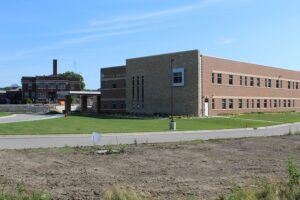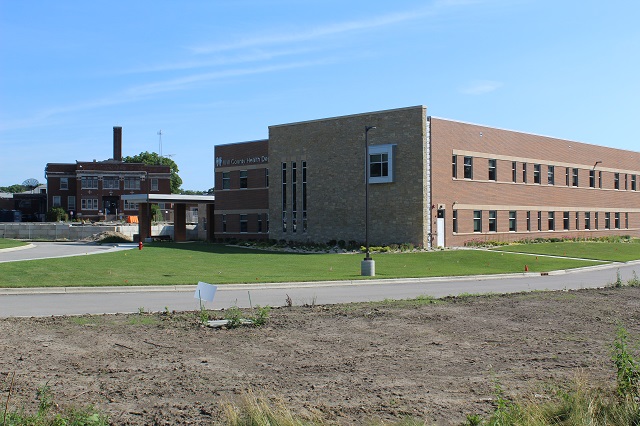It was early March when the State of Illinois, the county, and the entire world all realized that major action needed to be taken against the Coronavirus Pandemic. Events were cancelled, schools were closing, cases of Covid19 were quickly climbing, and people were scared and had many questions and concerns. COVID-19 was new to everyone. The WCHD (Will County Health Department) had a sudden influx of calls, and needed a way to answer the questions of community members and businesses quickly.
Katie Weber, WCHD Emergency Response Coordinator, immediately made the decision to set up a hotline specifically for responding to the hundreds of COVID-19 calls being received each day. The following afternoon, March 16th, it was up and ready to go, at 815-740-8977. The hotline was set up in the lower level Community Room, with available WCHD employees.
“We had fact sheets from the IDPH (Illinois Department of Public Health) and CDC (Centers for Disease Control and Prevention),” Weber recalled. “In addition, we developed talking points in a binder for all volunteers who were available to work the hotline.”

In both the old WCHD building (in back, but now torn down) and WCHD’s new home, the COVID-19 Hotline has existed through the pandemic thanks to the work of these volunteers: Barbara Agor, Betsy Cozzie, Caitlin Murray, Chris O’Brien, Cindy Jackson, Corina Saenz, Courtney Orlando, Dan Hamilton, David Campbell, Estella Cuevas, Gabby Reyes, Gloria Flores, Hope Cathelyn, Jackie Buldak, Jen Scanlon, Jill Santoro, Kathy Harkins, Katie Schram, Katie Weber, Kim Koran, Lidia Seay, Lisa Carlson, Lucy DioGuardi, Martha Martinez, Ofelia Martinez, Peggy Todd, Rebecca Deang, Silvia Sablich, Susan Szeremeta, Tabitha Jones, and Tricia Kautz.
“Like everything else during this pandemic, things were constantly changing, and so were the questions. So, each day we updated the talking points to reflect new information, as well as answers to the new questions being asked. Plus, we were assisting our Communicable Disease staff by making some of the follow-up calls to those who had tested negative.”
Weber recalls that getting WCHD employees to assist was not difficult. “We contacted all the division directors and were able to pull in employees willing to help. A lot of programs were scaling back due to COVID-19, and so many who were in those programs were willing and able to step up. Barb Agor (also with WCHD Emergency Preparedness and Response) was able to manage the scheduling, and then continuously update both that and the talking points.”
Besides WCHD employees, COVID-19 Hotline volunteers also included Lewis University nursing students. Will County Board of Health member and Lewis University College of Nursing Sciences and Health Sciences Associate Professor Nanci Reiland was grateful for the opportunity for the students.
“It was wonderful to have some of the community health and health promotion course nursing students assist with the hotline and some testing follow-up calls,” Reiland recalled. “Especially since it was a time when our clinical opportunities abruptly were halted, this allowed the students to use their communication skills and clinical backgrounds, and also gave them a glimpse of the workings of a health department.”
In addition, members of the WCHD MRC (Medical Reserve Corps) also stepped forward to help. The MRC is a group of volunteers managed by the EP&R division that is standing at the ready to assist with public health emergencies and participates in a variety of community-based public health activities.
Weber recalls that once these initial call takers for the hotline were in place, the first afternoon of operations brought in over 200 calls. Some were about what COVID-19 was, what symptoms to look for, and where and if they could be tested (the latter being a situation that was constantly changing early on). Other calls were concerns and questions regarding schools, businesses, or organizations and their handling of the pandemic.
“If we were notified about a potentially dangerous situation where masks were not being used or social distancing was not being followed, we would have someone call them and offer advice. And still today, if the hotline receives a call about this, our Environmental Health Division is able to send someone to check out the situation and offer advice to the business.”
In addition, Weber says, the hotline workers were also maintaining a safe situation. “They would all contribute in wiping down their areas during breaks, and then we had our group in the center ready to jump in and assist. Sometimes they had to take a question upstairs to our Communicable Disease department, or step in on the phones if someone was called back to their regular duties.”
In April came the move next door into the new Will County Health Department Building. “That is where Hope Cathelyn and her Vision and Hearing staff really stepped in,” said Weber. “The hotline was moved into their offices, then elsewhere temporarily when it was their department’s turn to move. Then, Hope’s staff took over in the new building for several weeks. We were also so glad to have Cindy Jackson’s Community Health Education staff offer so much of their time.“
Although the number of callers to the WCHD COVID-19 Hotline, once consistently at around 100 per day, now hovers around 20 each day, it is still in existence and ready to answer questions, as the pandemic continues.
And meanwhile, WCHD continues to welcome MRC volunteers for this and other important public health needs. If you are interested and at least 18 years of age, please call 815-727-8802. Or e-mail Barb Agor at bagor@willcountyhealth.org.

